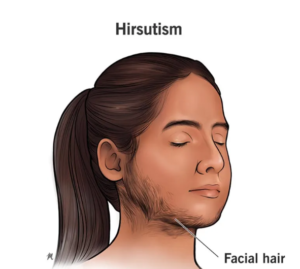What is PCOS?
PCOS (Polycystic Ovarian Syndrome) is a common hormonal disorder that affects women of reproductive age. It can impact how the ovaries work, affect metabolism, and influence overall health.
PCOS develops when the ovaries create an excess of androgens (male hormones), resulting in hormonal abnormalities that impede ovulation. Instead of releasing mature eggs during ovulation, the ovaries may form little fluid-filled sacs (follicles) that do not fully mature, causing irregular periods and fertility problems.
PCOS affects around one in every ten women globally and is the major cause of infertility.
Types of PCOS
PCOS is classified into four primary types based on the underlying cause:
1. Insulin-Resistant PCOS (Most Common) – Caused by elevated insulin levels, leading to weight gain, sugar cravings, and an increased risk of diabetes.
Managed with a low-carb diet, exercise, and insulin-regulating medications like Metformin.
2. Inflammatory PCOS – Caused by chronic inflammation, leading to fatigue, gastrointestinal issues, and skin problems. Managed with anti-inflammatory foods (omega-3s, turmeric), stress reduction techniques, and improvements in gut health.
3. Adrenal PCOS– Excessive stress leads to elevated cortisol levels. Managed through stress management techniques, adaptogenic herbs, and lifestyle modifications.
4. Post-Pill PCOS – Caused by discontinuing birth control pills, resulting in temporary hormonal imbalances.
Managed with a nutritious diet, hormone-balancing supplements, and patience.
Early Signs of PCOS
1.Menstrual Irregularities– Cycle longer than 35 days or shorter than 21 day. Irregular, unpredictable, or completely absent periods (oligomenorrhea or amenorrhea).
2. Heavy or prolonged menstrual bleeding (menorrhagia). Periods lasting more than 7 days or very heavy flow.
3. Hormonal Imbalances– Persistent acne that doesn’t improve with regular treatment. Elevated Androgen Levels: Leads to acne, oily skin, excessive facial and body hair (hirsutism), and male-pattern hair thinning.

4. Metabolic Issues– Weight Gain & Difficulty Losing Weight: Particularly around the midsection.
7. Insulin Resistance- Triggers sugar cravings, fatigue, and increases the risk of Type 2 diabetes.
8. Skin and Hair Changes– Hair thinning ana bald spots- Hair loss resembling male-pattern baldness.
Dark Skin Patches (Acanthosis Nigricans): Commonly appears on the neck, armpits, and groin.
9. Mental & Emotional Symptoms– Anxiety & Depression: Due to hormonal imbalances and metabolic changes. Mood Swings & Irritability: Affecting overall emotional well-being.
10. Disturbed Gut Health- PCOS is connected with your Gut Problems. Frequent constipation or diarrhea can be a sign of PCOS. PCOS starts with gut issues like- Abdominal pain, Gas, Acid reflux, Food intolerances (especially to gluten, dairy, or processed sugar), bloating, indigestion etc. Therefore it is necessary to maintain disturbed gut health.
How to Detect PCOS Early
- Track Your Menstrual Cycle
- Use a period-tracking app to monitor irregularities.
- If your cycles are consistently abnormal for 3+ months, consult a doctor.
2. Look for Signs of Insulin Resistance
- Frequent sugar cravings, fatigue after meals, or sudden weight gain may indicate insulin issues.
- Get a fasting insulin and glucose test if you suspect insulin resistance.
3. Get Hormonal Blood Tests
- A doctor may check for:
- Testosterone & Androgen Levels: High levels indicate PCOS.
- LH & FSH Ratio: An imbalanced ratio (LH higher than FSH) suggests PCOS.
- Insulin & Glucose Levels: To detect insulin resistance.
- Thyroid & Prolactin Levels: To rule out other conditions.
4. Consider a Pelvic Ultrasound
A pelvic ultrasound can detect multiple small follicles (cysts) on the ovaries.
5. Family History Check
If your mother or sister has PCOS then you are at higher risk.
ALSO READ – Top 12 most important things to reverse PCOS

Pingback: Top 12 most important things to reverse PCOS - Healthsamitha